As the gradual transition of classic Windows settings continues, Windows 11/10 has given Sound a special place in the settings. Available under Settings > System > Sound, it offers you to configure output device, troubleshoot, control volume, select input device, mic control, and also offers app volume, device preferences, and options for HMDs.
How to set up a different Speaker & Microphone for Apps in Windows 11
In Windows 11, you can set up different speakers and microphones for different apps. The following instructions will help you with that:
- Open Settings app.
- Select System from the left pane.
- Click on the Sound tab on the right side.
- Open Volume Mixer.
- Set up input and output devices for your apps.
Let’s see these steps in detail.
1] Open Windows 11 Settings app and go to “System > Sound.”
2] Now, scroll down and click on the Volume Mixer tab. You will find this tab in the Advanced section.
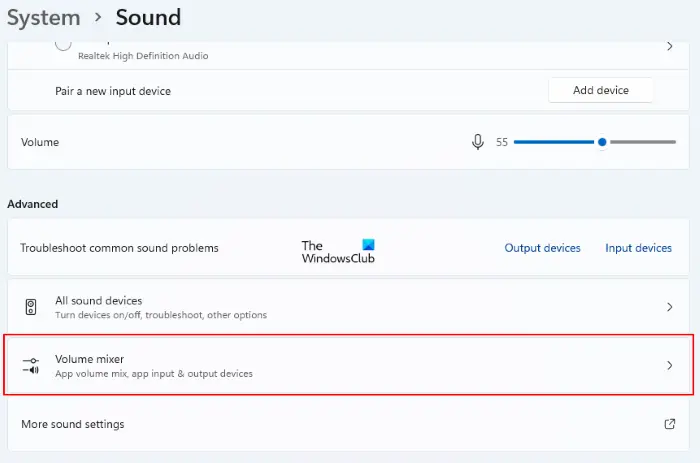
3] Now, select your app under the Apps section and click on the Output device and Input device drop-down menus. When you click on the drop-down menus, you will see all the speakers and microphones currently connected to your system. Select your desired speaker and microphone from the list. From now, that particular app will play audio only through the selected speaker and accepts sound input only from the selected microphone.
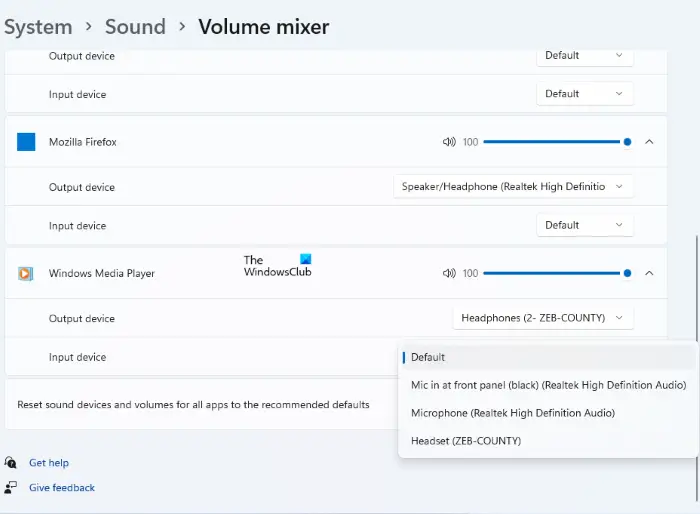
Do note that Windows will show you only those apps that are currently running on your system. For example, if you want to set up a speaker for Windows Media Player, you will see it in the Apps section only if it is running.
You can restore the default settings anytime by clicking on the Reset button.
How to configure Speaker (Output device) on Windows 11
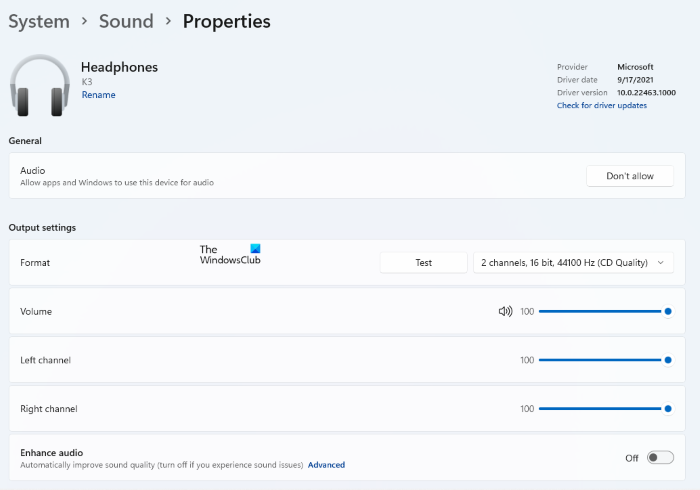
The steps to configure a speaker in Windows 11 are listed below:
- Launch the Settings app.
- Go to “System > Sound.”
- Click on the Choose where to play sound tab to expand it. You will see all your speakers connected to your system there.
- Click on the arrow next to the name of your speaker to open its properties.
Here, you will see a number of options to configure the speaker or headphones. Let’s see:
- You can increase or decrease its volume by adjusting the slider. In addition to that, you can also set the volume of your speaker’s Left and Right channels.
- You can select different audio formats for your speakers by clicking on the Format drop-down menu.
- If you want the computer to automatically improve the sound quality, turn on the Enhance audio button.
- If you want to test your speaker, click on the Test button.
How to configure Microphone (Input device) on Windows 11
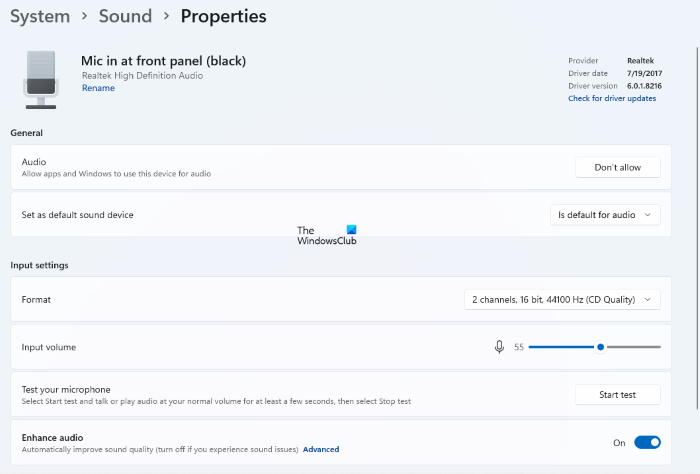
The steps to configure a microphone on Windows 11 are listed below:
- Open Windows 11 Settings.
- Go to “System > Sound.”
- Expand the Choose a device for speaking or recording tab under the Input section.
- Click on the arrow next to the name of your microphone to open its properties.
On the microphone properties page, you can set it as a default sound device, set its input volume, and select its input sound format. To test your microphone, click on the Start Test button.
Set up different Speaker & Microphone for Apps in Windows 10
For different apps you can set different speakers. Change output audio output device & volume per app. This post will show you how to set per-app sound outputs.
App Volume and device preference
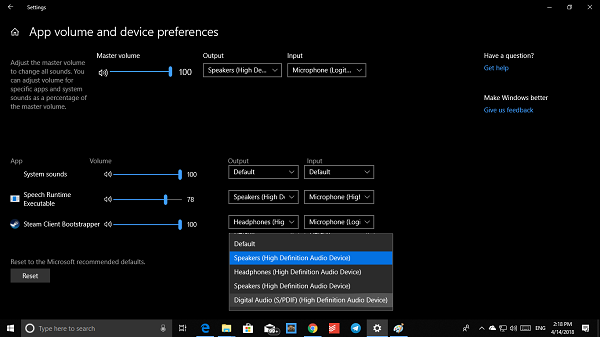
It is possible that some apps use custom output settings, and here you can personalize these in-app volumes using this option. Use this to adjust the master volume to changes all sounds. You can change the volume of Windows 10 and apps individually.
The best part of this new configuration is that if you want to set different headphone and microphone for a particular app or game, you can choose it right here. You don’t have to switch every time you are using them on your PC.
It seems Microsoft has enabled this feature, but developers need to hook their apps here as well. As of now, I don’t see many apps here except for the one listed in the image.
HMDs
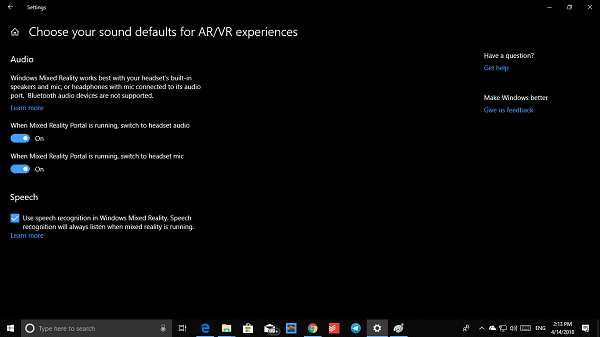
This section lets you choose sound defaults for AR/VR experiences. The default uses the HMD speaker and microphone, and it enables automatically when you connect it to your PC. However, if you want to use your Microphone and Speakers, you can turn off the options for automatic using the toggles for the following:
- When Mixed Reality Portal is running, switch to headset audio.
- When Mixed Reality Portal is running, switch to a headset mic.
There is an option for Speech as well using which you can make sure Speech recognition even when you are in Windows Mixed Reality
Configure Output Device
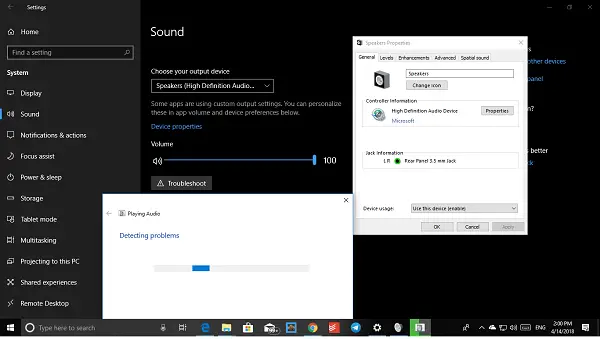
This can be easily done from the Volume icon in the System tray; here, you get two additional options: first, you can access the device properties, and second, you can troubleshoot. Clicking on the device properties will open the class window for that device. It may offer options to disable enhancements, select the sample rate and bit depth, and configure the spatial sound.
Configure Input Device aka Microphone
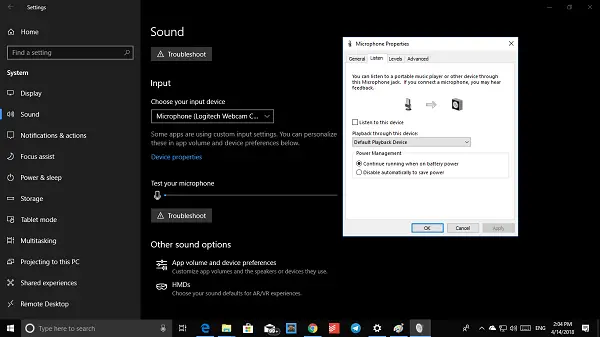
If you have a webcam with a Microphone or a dedicated microphone attached to your Windows 10 PC, you can set up the microphone and configure it here.
You can switch between them and configure device properties. I find the Listen to option for Mics very interesting. This microphone lets you listen to a portable music player or another device. However, feedback might appear.
The troubleshoot button makes it easier to figure out the problem, especially if you use a Microphone on a daily basis, such as for writing documents or making voice calls.
Can I use headphones and speakers at the same time in Windows 11?
Yes, you can play music through your speakers while using headphones. For this, first, connect both your headphones and speaker to your computer and make your speaker a default communication device. After that, you have to select your second audio device in Stereo Mix properties.
How do I separate apps with sound in Windows 11?
In Windows 11/10, you can separate apps with sound by setting up different output audio devices for different apps. This article explains the procedure for doing this on Windows 11 and Windows 10 devices.
About time, it always boggled my mind why it hasn’t been a feature since Netflix started streaming